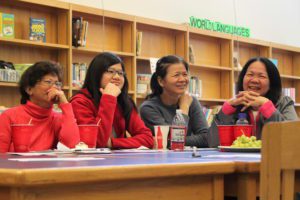By Joyce Yee, LEV Community Organizer
 The Vietnamese Friendship Association (VFA) offers after school and Saturday school programs to all English Language Learner (ELL) students who attend the Seattle World School in the Seattle school district.
The Vietnamese Friendship Association (VFA) offers after school and Saturday school programs to all English Language Learner (ELL) students who attend the Seattle World School in the Seattle school district.
Some unique challenges that ELL students face to being successful and self-sufficient are that their families face language barriers, poverty and discrimination, and are unable to help them be successful at school. ELL students tend to be one or more years behind their native English speaking peers, and only half graduate from high school, compared to the state average of 80%.
ELL students often come to the U.S. with little formal education as teens, and only have a few years to learn English and finish high school successfully. VFA served 239 students in their youth programs, ages 11 – 20: 98% were low-income; 46% were female and 54% male; 40% from Africa, 32% Asia, 26% South America, 2% Europe and the Middle East. Youth who participated in VFA’s programs achieved the equivalent of half a grade higher in math and reading by the end of the school year, compared to their peers. 78% of youth strengthened skills and assets that support positive social development.
VFA works in partnership with the Seattle World School to connect students to their programs through recruitment on their end and referrals by staff at the school. The school offers office and classroom space for VFA to offer after-school programs, plus staff referrals.
VFA offers after school and Saturday programming through strong partnerships with community based organizations including Coyote Central, Refugee Women’s Alliance, Jack Straw, Bike Works, and Neighborhood House. The other organizations provide programming, and VFA offers its expertise on how to work effectively with ELL students and families. In many of their programs, components are built in to offer both students and their parents/guardians learning opportunities.
VFA’s after-school programs include academic support, enrichment classes and job readiness. They offer academic support through their English/Homework help group and one-on-one tutoring. Enrichment classes include culinary, woodworking, and music. Jack Straw’s Guitar class meets twice a week to work on basic guitar skills. Students can also do service learning; they are assigned to teams that identify a community need that they would like to work on.
The Youth Job Readiness Training program teaches students skills such as resume preparation, interviewing, how to handle workplace conflicts, plus internship opportunities. It is offered to 20 students between 15 and 20 years old. While students learn about academics and career preparation, parents learn skills to support their students in being successful. A family engagement coordinator teaches parents how to navigate K-12 school systems and how to seek financial aid for their children to attend college. VFA holds regular family engagement meetings as part of the Job Readiness program for students only, guardians only, and also offers meetings that bring together both students and guardians.
The Saturday school focus is being revised to offer academic and enrichment activities. Academics include English 101 with content on math, reading, healthy relationships, and test prep for the World Language test so that ELL students can take the language proficiency test and earn elective credits for their language ability. The healthy relationship section teaches both students and parents through role playing how both can understand each other better, such as the challenges facing bilingual students versus parent expectations for them. A culinary series is also offered concurrently, where participants learn culinary skills through meal prep, cooking, and serving meals to Saturday school attendees. While students are learning, their parent or other adults in the household can take classes in English as a second language, and learn computer skills.
Over time, as families and their students get to know VFA through activities, they build a strong sense of community with each other. Parents have offered to prepare food for their group meetings for parents/guardians, and students who have completed the Saturday classes come back to volunteer.
Shouldn’t programs like the VFA’s be part of basic education?
#BeyondBasic
Read LEV’s blog post on Student Supports, an Integral Component of Basic Education
One comment on “Community Support for English Language Learners”
The sound relationship area educates both understudies and guardians through pretending how both can see each other better, for example, the difficulties confronting bilingual understudies versus parent desires for them